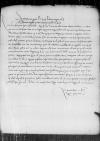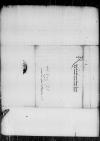Non est clam Paternitatem Tuam iam inde ab annis aliquot contractum esse matrimonium inter serenissimum Sigismund II Augustus Jagiellon (Zygmunt II August) (*1520 – †1572), 1529-1572 Grand Duke of Lithuania (ruled from 1544); 1530-1572 King of Poland (crowned vivente rege (ruled from 1548, after the death of his father); son of Sigismund I Jagiellon and Bona Sforza⌊filium nostrumSigismund II Augustus Jagiellon (Zygmunt II August) (*1520 – †1572), 1529-1572 Grand Duke of Lithuania (ruled from 1544); 1530-1572 King of Poland (crowned vivente rege (ruled from 1548, after the death of his father); son of Sigismund I Jagiellon and Bona Sforza⌋ et serenissimi Ferdinand I of Habsburg (*1503 – †1564), from 1521 Archduke of Austria, from 1526 King of Bohemia and Hungary, Croatia and Slavonia as Ferdinand I, 1531-1558 King of the Romans, 1558-1564 Holy Roman Emperor; son of Philip I the Handsome and Joanna the Mad of Castile, a younger brother of Charles V of Habsburg⌊Romanorum regisFerdinand I of Habsburg (*1503 – †1564), from 1521 Archduke of Austria, from 1526 King of Bohemia and Hungary, Croatia and Slavonia as Ferdinand I, 1531-1558 King of the Romans, 1558-1564 Holy Roman Emperor; son of Philip I the Handsome and Joanna the Mad of Castile, a younger brother of Charles V of Habsburg⌋ Elisabeth of Austria (Elizabeth von Habsburg) (*1526 – †1545), Queen of Poland, Grand Duchess of Lithuania; first wife of Sigismund II August Jagiellon (1543-1545), daughter of Ferdinand I of Habsburg, and Anna Jagiellon⌊filiam natu maximamElisabeth of Austria (Elizabeth von Habsburg) (*1526 – †1545), Queen of Poland, Grand Duchess of Lithuania; first wife of Sigismund II August Jagiellon (1543-1545), daughter of Ferdinand I of Habsburg, and Anna Jagiellon⌋ neque aliud ad extremum illius actum perficiendum defuisse, quam ut serenissima sponsa ad serenissimum sponsum traducatur et nuptiarum sollemnia celebrentur. Quibus cum dies dicta sit 1542-07-01⌊prima Iulii1542-07-01⌋[1], iam nos itineri accingimus, ut ad diem nuptiarum Cracow (Kraków, Cracovia), city in southern Poland, Małopolska, on the Vistula river, from 1038 capital of the Kingdom of Poland⌊CracoviaeCracow (Kraków, Cracovia), city in southern Poland, Małopolska, on the Vistula river, from 1038 capital of the Kingdom of Poland⌋ praesto adesse possimus. Paternitatem Tuam hortamur, ut ad nuptias serenissimi Sigismund II Augustus Jagiellon (Zygmunt II August) (*1520 – †1572), 1529-1572 Grand Duke of Lithuania (ruled from 1544); 1530-1572 King of Poland (crowned vivente rege (ruled from 1548, after the death of his father); son of Sigismund I Jagiellon and Bona Sforza⌊filiiSigismund II Augustus Jagiellon (Zygmunt II August) (*1520 – †1572), 1529-1572 Grand Duke of Lithuania (ruled from 1544); 1530-1572 King of Poland (crowned vivente rege (ruled from 1548, after the death of his father); son of Sigismund I Jagiellon and Bona Sforza⌋ nostri, quem unicum uniceque carum habemus, honestandas una cum suo amicorumque, prout illi videbitur commodum, decenti apparatu venire ne gravetur.
Aequum quidem erat, ut ea de re temporius ad Paternitatem Tuam scripsissemus, sed cum ipsi quoque non satis certum habuerimus, utrum ad praefinitum diem venire nobis Cracow (Kraków, Cracovia), city in southern Poland, Małopolska, on the Vistula river, from 1038 capital of the Kingdom of Poland⌊CracoviamCracow (Kraków, Cracovia), city in southern Poland, Małopolska, on the Vistula river, from 1038 capital of the Kingdom of Poland⌋ liceret, maturius illi significare non potuimus.
Nunc primum, cum legati nostri satis ex sententia confectis rebus ex Muscovy (Grand Duchy of Muscovy, Moscovia)⌊MoschoviaMuscovy (Grand Duchy of Muscovy, Moscovia)⌋ redierunt, ante quorum reditum de nostra in regnum profectione nihil deliberatum satis habebamus.
Scripsimus quidem ad serenissimum dominum Ferdinand I of Habsburg (*1503 – †1564), from 1521 Archduke of Austria, from 1526 King of Bohemia and Hungary, Croatia and Slavonia as Ferdinand I, 1531-1558 King of the Romans, 1558-1564 Holy Roman Emperor; son of Philip I the Handsome and Joanna the Mad of Castile, a younger brother of Charles V of Habsburg⌊Romanorum regemFerdinand I of Habsburg (*1503 – †1564), from 1521 Archduke of Austria, from 1526 King of Bohemia and Hungary, Croatia and Slavonia as Ferdinand I, 1531-1558 King of the Romans, 1558-1564 Holy Roman Emperor; son of Philip I the Handsome and Joanna the Mad of Castile, a younger brother of Charles V of Habsburg⌋, ut ad 1542-08-24⌊diem divo Bartholomeo sacrum1542-08-24⌋, si visum maiestati eius esse, negotium reiceret. Quid responsi sit nobis daturus, nescimus, nuntium nostrum in dies exspectamus.
Paternitas Tua interim se adornare ad iter velit, quod si quae prorogatio facta erit, serius quam ad 1542-07-01⌊diem primam Iulii1542-07-01⌋ venire poterit. Quod si quae prorogatio facta erit, serius quam ad diem primam Iulii venire poterit. Nunc ipsi hoc agimus, ut nostro Cracoviam reditu diem nuptiis praestitutum antevertamus. Ad quem, ut venire curet Paternitas Tua, nisi aliud aliquid de prorogatione facta certi audiverit, <hortamur>. Melius enim est, ut nos paratos nova nupta offendat. Facturus pro gratia nostra.


 BCz, 1601, p. 362
BCz, 1601, p. 362